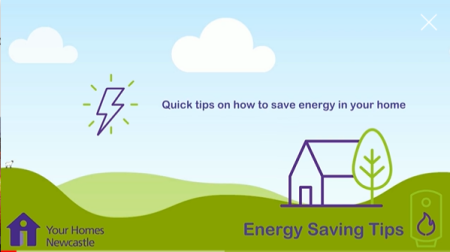10 June 2022
Energy saving advice
Energy saving advice
We all like to do our bit for the environment, but as household bills rise, there is now even more reason to reduce the amount of gas, electricity and water we use.
Making a few small changes in your home could cut your energy and water bills by around £180 a year- who wouldn’t want that? We have produced a short guide to saving energy and water to help you do just that. It includes tips on improving energy and water efficiency and information about switching energy supplier – hopefully you will soon start making savings on your utility bills.
We have created videos to help save energy plus we have lots of advice to read below:
1. Make sure your home is insulated
YHN is insulating properties using loft and cavity insulation where possible. This significantly reduces heat loss through the wall and roof of a building.
If you think your home has not been insulated you can contact YHN to check this and find out if you can get an upgrade of the insulation.
Please note, some properties cannot be insulated using traditional loft or cavity wall insulation techniques, but we are looking for other ways to improve these homes.
2. Turn down the heat
You can make big savings by reducing the amount of energy you use to heat your home or using your heating more efficiently. Turning your thermostat down by 1˚C can save up to 10% on your heating bills- that could be up to £50 a year!
It is important though that you do not let your home get too cold – this will cause condensation and mould which could damage your health. The recommended temperature for a living room is 21˚C, while a bedroom should be 18˚C or above.
If the weather is not too cold, set your timer so that your central heating only comes on when you are at home. During really cold weather, leave your heating on a low level by turning down your thermostat. If you are going out in the evening or going away for a few days, set the thermostat to a low temperature such as 13˚C. That way you will reduce your heating bills without the risk of your water pipes freezing up or having damp and mildew develop.
Once you have warmed up your rooms, keep the heat inside by closing your curtains when it gets dark and cold outside. This stops heat escaping through the windows. You can place draught excluders at the bottom of internal doors – this will make rooms feel warmer (please do not use draught excluders which are screwed directly onto doors).
If you do not know how to use your thermostat, programme your heating or operate your storage heater controls, contact YHN for help.
3. Switch off the lights
Energy saving light bulbs are available. They use up to 80% less electricity and last 10 times longer than a standard bulb.
Using energy efficient light bulbs is no excuse for leaving lights switched on in rooms that you are not using. Switch lights off as you leave an empty room and you could save up to £20 a year. If you are in the habit of leaving a light on overnight in your child’s room or on the landing, use a low energy nightlight. They are cheap to buy, cost very little to run and give off a reassuring glow.
4. Use your appliances efficiently
Do not be wasteful about how you use your appliances and when you buy new appliances choose products that have a good energy rating. For example an A++ rated fridge freezer could cost £30 less a year compared to a C rated one, or £70 less compared to a G rated one!
5. Cooking and Cleaning
Refrigeration
Regularly defrost your fridge and freezer to keep them running efficiently. Do not over work your fridge by putting in warm food - let it cool down first. If possible position your fridge and freezer away from cookers, radiators or heaters. You could also use a refrigerator thermometer to make sure your fridge is at the right temperature and not using too much energy.
Cooking
When making toast it is better to use a toaster than a grill – this will save a lot of energy and money. When you are boiling a kettle only boil as much water as you need.
Saucepans will heat up faster if you cover them with a lid. You should also match the saucepan size to the size of cooker rings on your hob, so try to use bigger pans on bigger rings. It is even better to use a steamer and cook three or four different things together.
Planning ahead will mean you waste less food and if you do have leftovers, they take less energy to reheat than cooking an entire meal from the start again.
Washing
To save electricity, water and washing powder, only put your washing machine on when you have a full load. One full load uses less energy than two half loads. Set your machine to 30˚C or 40˚C instead of 60˚C and you’ll use a third less electricity.
6. Do not leave things on standby
Most households add around £40 to their annual bill by leaving appliances on standby. Turn off electrical appliances completely by switching them off at the plug.
Do not leave mobile phones and laptops charging longer than you need to, unplug them as soon as they are finished charging. As a simple rule, if a charger is getting hot it is wasting energy, so switch it off!
7. Washing and Bathing
As a general rule baths are more expensive than showers, using more water that must be heated.
However, it is important to note that taking a shower for longer than 5 minutes actually uses more hot water than most baths, so it is important to keep showers short.
If you get a home environmental survey we can identify if you would benefit from water saving measures and arrange to get these fitted. More information is provided in section 10 on this offer.
8. Get a water meter fitted
Fitting a water meter at your property could save you money by making sure you only pay for what you use. It will not save energy on its own, but it might help you and your household to waste less water and reduce energy costs through having to heat less water for showers etc.
If you have not made any savings after the first 12 months of installing a water meter you can switch back to the unmetered tariff. There is also a special reduced tariff called ‘WaterSure’ for vulnerable customers who are supplied by meter and need to use large volumes of water due to their personal circumstances.
To find out more contact Northumbrian Water by telephone on 0845 733 5566 or visit www.nwl.co.uk.
9. Home Environmental Visit
You can arrange a visit to your home by a trained officer to give you more in depth advice about how to save energy, as well as advice on other environmental topics like water saving. During this visit we will be able to assess your home for other ways we can help you make your home feel warmer, and save energy and water.
Information source
All information in this guide has been sourced from the Energy Saving Trust unless otherwise stated.
This guide is available as a leaflet. Download a copy here.

